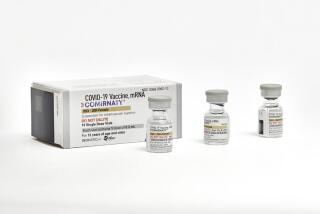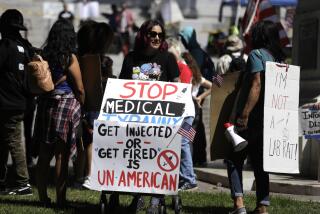Review: Eula Biss’ ‘On Immunity’ is a beautiful shot of insight
“The womb is sterile,” Eula Biss observes toward the end of “On Immunity: An Inoculation,” her meditation on the risks and rewards of vaccination, “and so birth is the original inoculation.” From the moment of our emergence, this means, we are equally confirmed and compromised. It is in the passage from our mothers’ bodies, after all, that we are first exposed to the germs and microbes that both threaten and, in many ways, define us — without which, in the most literal sense, we cannot survive.
“We have more microorganisms in our guts,” Biss writes, “than we have cells in our bodies — we are crawling with bacteria and we are full of chemicals. We are, in other words, continuous with everything here on earth. Including, and especially, each other.” That’s the point of this elegant, intelligent and very beautiful book, which occupies a space between research and reflection, investigating our attitudes toward immunity and inoculation through a personal and cultural lens.
Inspired by the birth of her son and subsequent encounters with parents opposed to vaccination (in California, as an example, families are choosing not to vaccinate at a rate twice that of seven years ago), Biss moves from folklore to epidemiology to literature, riffing on Voltaire and “Dracula,” mercury and autism, paranoia and politics.
“Our fears,” she warns, “are informed by history and economics, by social power and stigma, by myths and nightmares.... When we encounter information that contradicts our beliefs, … we tend to doubt the information, not ourselves.”
This is, perhaps, the key to “On Immunity,” which addresses not only the infections caused by viruses but also those caused by ideas. For Biss, whose last book, “Notes from No Man’s Land: American Essays” won the National Book Critics Circle Award in criticism, that has a lot to do with race and class, which emerge like microbial agents, affecting everything in their path.
“Unvaccinated children,” she points out, “are more likely to be white, to have an older married mother with a college education, and to live in a household with an income of $75,000 or more — like my child.... Undervaccinated children, meaning children who have received some but not all of their recommended immunizations, are more likely to be black, to have a younger unmarried mother, to have moved across state lines, and to live in poverty.”
The key phrase there is “like my child” — an admission of complicity (financial, social and cultural, if not medical) so stark and startling you almost have to read it twice.
Make no mistake: Biss’ child is not unvaccinated. She is a vigorous advocate for inoculation; throughout the book, she reveals the rhetoric of the anti-vaccination movement for the sophistry it is. At the same time, she understands the fear at its heart. “Having children,” a friend reminds her, “is the greatest risk you can take,” and anyone who has been a parent knows that she is right. “I thought of the mothers in Daniel Defoe’s ‘Journal of the Plague Year,’” Biss writes later, “who were said to have died after losing their children — not of the plague, but of grief.”
Such grief, or the fear of it, can make us lose sight of our inherent human interdependence, which Biss evokes through the filter of herd immunity. For her, this is both mandate and metaphor, a phenomenon — in which “vaccinating only part of a population … could arrest an epidemic in full” — that “seems implausible only if we think of our bodies as inherently disconnected from other bodies. Which, of course, we do.”
It’s a lovely concept, one that suggests the extent to which we rely on one another, to which our individual acts and intentions feed back to a larger whole. This, Biss argues, is what motherhood, parenthood, also teaches, that for better and for worse we are inextricably linked.
Late in the book, she recalls a conversation with her son about umbilical cords; “I point to my belly button,” she reports, “and tell him that all of us were once contained within another body on which our lives depended.” The metaphor of our joining is implicit.
Some of the most disturbing material in “On Immunity” deals with what happens when this compact is corrupted: “the unvaccinated child who returned from a trip to Switzerland in 2008 with a case of the measles that infected eleven other children,” the 2003 campaign in Nigeria to suspend polio inoculations because of the belief that Western powers “have deliberately adulterated the oral polio vaccines with anti-fertility drugs and contaminating it with certain viruses which are know to cause HIV and AIDS.”
What Biss is getting at is distrust of the other, an epidemic that cuts both ways. We live in a culture that prides itself on being rational, when in fact we are as governed by superstitions, suppositions, as we ever were. As to why this is, she argues, it has to do not with what is true so much as what we wish was true, which leads us “to lend false credibility to … idea[s] that we want to believe for other reasons.”
We want to believe we are immune from uncertainty, from unknowing, from the danger of living, loving, of the vagaries of fate. And yet, what can we be sure of, really? The answer is nothing. The world goes on, regardless of our fears or our desires. “[L]ive the question,” Biss exhorts, quoting Rainer Maria Rilke. “This, my mother reminds me, is as essential to mothering as it is to poetry — we must live the questions our children raise for us.”
In that regard, “On Immunity” seeks to function as a cultural inoculation; hence the subtitle of the book. It is elliptical, elusive, neither collection nor narrative exactly but more a set of questions about how we frame our interactions with the world.
“What has been done to us,” Biss writes, “seems to be, among other things, that we have been made fearful. What will we do with our fear? This strikes me as a central question of both citizenship and motherhood.” Yes, and a central question of humanity also, the ability or willingness to reckon with all we do not, cannot, know.
Follow me on Twitter: @davidulin
On Immunity
An Inoculation
Eula Biss
Graywolf: 206 pp., $24
More to Read
Sign up for our Book Club newsletter
Get the latest news, events and more from the Los Angeles Times Book Club, and help us get L.A. reading and talking.
You may occasionally receive promotional content from the Los Angeles Times.







